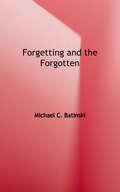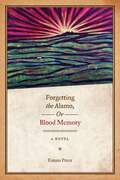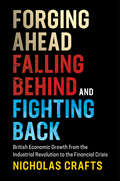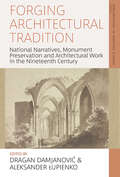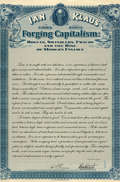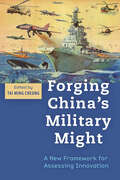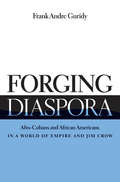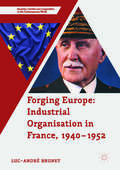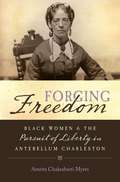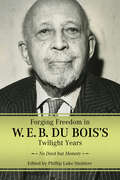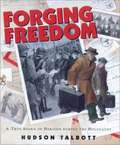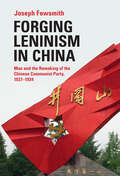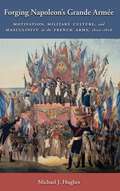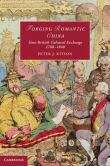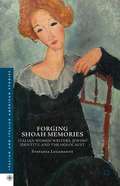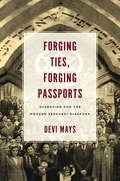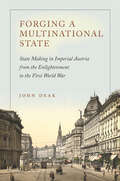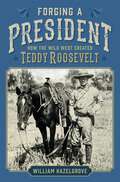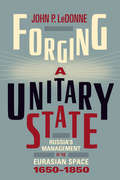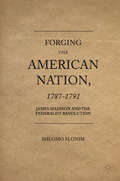- Table View
- List View
Forgetting Polish Violence Against the Jews: The Great Whitewash (Memory Studies: Global Constellations)
by Tomasz ŻukowskiDuring the Holocaust, Polish bystanders were witnesses not only to Nazi crimes but also to their own collective violence toward Jewish neighbors. This book shows how these memories continue to be distorted and silenced in the Polish culture.Considering the ways in which Polish culture displays symptoms of a suppressed and violent memory while obstinately refusing to see the meaning of such symptoms, the author shows how the narrative of the Holocaust, in threatening the self-image of the community, causes a continuous anxiety and thus compulsive and neurotic reactions. Through analyses of a wide range of literary, journalistic, commemorative, and cinematic texts, Forgetting Polish Violence Against the Jews sheds light on a set of narrative and discursive models connected with social practices, which serve to discipline individuals – especially Polish Jews – while generating pressure to defend both habits of silence and also an idealized selfimage of the Polish Christian majority.This book will appeal to scholars with interests in memory studies, cultural studies, Holocaust studies, and psychoanalytic studies.
Forgetting and the Forgotten: A Thousand Years of Contested Histories in the Heartland (Shawnee Bks.)
by Michael C. BatinskiHistories try to forget, as this evocative study of one community reveals. This book details the nature of how a community forged its story against outsiders. <p><p>Historian Michael C. Batinski explores the habits of forgetting that enable communities to create an identity based on silencing competing narratives. The white settlers of Jackson County, Illinois, shouldered the hopes of a community and believed in the justice of their labor as it echoed the national story. The county's past keepers, or keepers of the past, emphasizing the white settlers' republican virtue, chose not to record violence against Kaskaskia people and African Americans and to disregard the numerous transient laborers. Instead of erasing the presence of outsiders, the past keepers could offer only silence, but it was a silence that could be broken. <p><p>Batinski's historiography critically examines local historical thought in a way that illuminates national history. What transpired in Jackson County was repeated in countless places throughout the nation. At the same time, national history writing rarely turns to experiences that can be found in local archives such as court records, genealogical files, archaeological reports, coroner's records, and veterans' pension files. <p><p>In this archive, juxtaposed with the familiar actors of Jackson County history—Benningsen Boon, John A. Logan, and Daniel Brush—appear the Sky People, Italian immigrant workers, black veterans of the Civil War and later champions of civil rights whose stories challenge the dominant narrative.
Forgetting the Alamo, Or, Blood Memory: A Novel (Chicana Matters)
by Emma PérezIn this literary novel set in nineteenth-century Texas, a Tejana lesbian cowgirl embarks on an adventure after the fall of the Alamo.Micaela Campos witnesses the violence against Mexicans, African Americans, and indigenous peoples after the infamous battles of the Alamo and of San Jacinto, both in 1836. Resisting an easy opposition between good versus evil and brown versus white characters, the novel also features Micaela&’s Mexican-Anglo cousin who assists and hinders her progress. Micaela&’s travels give us a new portrayal of the American West, populated by people of mixed races who are vexed by the collision of cultures and politics. Ultimately, Micaela&’s journey and her romance with a Black/American Indian woman teach her that there are no easy solutions to the injustices that birthed the Texas Republic . . .This novel is an intervention in queer history and fiction with its love story between two women of color in mid-nineteenth-century Texas. Pérez also shows how a colonial past still haunts our nation&’s imagination. The battles of the Alamo and San Jacinto offered freedom and liberty to Texans, but what is often erased from the story is that common people who were Mexican, Indian, and Black did not necessarily benefit from the influx of so many Anglo immigrants to Texas. The social themes and identity issues that Pérez explores—political climate, debates over immigration, and historical revision of the American West—are current today.&“Pérez&’s sparse, clean writing style is a blend of Cormac McCarthy, Carson McCullers, and Annie Proulx. This makes for a quick and engrossing reading experience as the narrative has a fluid quality about it.&” —Alicia Gaspar de Alba, professor and chair of Chicana and Chicano Studies, University of California, Los Angeles, and author of Sor Juana&’s Second Dream &“Riveting . . . Emma Pérez captures well the violence and the chaos of the southwest borderlands during the time of territorial and international disputes in the 1800s. . . . Perez vividly depicts the conflicts between nations with the authority of a historian and with language belonging to a poet. A fine, fine read.&” —Helena Maria Viramontes, author of Their Dogs Came with Them&“Pérez&’s new novel . . . Powerfully presents a revenge tale from an unusual point of view, that of a displaced Chicana in 1836 Texas. . . . The writing is sharp and clever. The dialogue is realistic.&” —Lambda Literary, Lambda Award Finalist &“Filled with lush beauty, harshness, and horrifying brutality, this is one of those books in which you just KNOW what&’s going to happen at the end—but you&’re wrong.&” —The Gay & Lesbian Review
Forgetting the Alamo, or, Blood Memory: A Novel (Chicana Matters)
by Emma PérezThis literary adventure takes place in nineteenth-century Texas and follows the story of a Tejana lesbian cowgirl after the fall of the Alamo. Micaela Campos, the central character, witnesses the violence against Mexicans, African Americans, and indigenous peoples after the infamous battles of the Alamo and of San Jacinto, both in 1836. Resisting an easy opposition between good versus evil and brown versus white characters, the novel also features Micaela's Mexican-Anglo cousin who assists and hinders her progress. Micaela's travels give us a new portrayal of the American West, populated by people of mixed races who are vexed by the collision of cultures and politics. Ultimately, Micaela's journey and her romance with a black/American Indian woman teach her that there are no easy solutions to the injustices that birthed the Texas Republic.<P><P> This novel is an intervention in queer history and fiction with its love story between two women of color in mid-nineteenth-century Texas. Pérez also shows how a colonial past still haunts our nation's imagination. The battles of the Alamo and San Jacinto offered freedom and liberty to Texans, but what is often erased from the story is that common people who were Mexican, Indian, and Black did not necessarily benefit from the influx of so many Anglo immigrants to Texas. The social themes and identity issues that Pérez explores—political climate, debates over immigration, and historical revision of the American West—are current today.
Forging Ahead, Falling Behind and Fighting Back: British Economic Growth from the Industrial Revolution to the Financial Crisis
by Nicholas CraftsTo what extent has the British economy declined compared to its competitors and what are the underlying reasons for this decline? Nicholas Crafts, one of the world's foremost economic historians, tackles these questions in a major new account of Britain's long-run economic performance. He argues that history matters in interpreting current economic performance, because the present is always conditioned by what went before. Bringing together ideas from economic growth theory and varieties of capitalism to endogenous growth and cliometrics, he reveals the microeconomic foundations of Britain's economic performance in terms of the impact of institutional arrangements and policy choices on productivity performance. The book traces Britain's path from the first Industrial Revolution and global economic primacy through to its subsequent long-term decline, the strengths and weaknesses of the Thatcherite response, and the improvement in relative economic performance that was sustained to the eve of the financial crisis.
Forging Architectural Tradition: National Narratives, Monument Preservation and Architectural Work in the Nineteenth Century (Explorations in Heritage Studies #4)
by Dragan Damjanović Aleksander ŁupienkoDuring the nineteenth century, a change developed in the way architectural objects from the distant past were viewed by contemporaries. Such edifices, be they churches, castles, chapels or various other buildings, were not only admired for their aesthetic values, but also for the role they played in ancient times, and their role as reminders of important events from the national past. Architectural heritage often was (and still is) an important element of nation building. Authors address the process of building national myths around certain architectural objects. National narratives are questioned, as is the position architectural heritage played in the nineteenth and the early twentieth centuries.
Forging Arizona: A History of the Peralta Land Grant and Racial Identity in the West (Latinidad: Transnational Cultures in the)
by Anita Huizar-HernándezIn Forging Arizona Anita Huizar-Hernández looks back at a bizarre nineteenth-century land grant scheme that tests the limits of how ideas about race, citizenship, and national expansion are forged. During the aftermath of the U.S.-Mexico War and the creation of the current border, a con artist named James Addison Reavis falsified archives around the world to pass his wife off as the heiress to an enormous Spanish land grant so that they could claim ownership of a substantial portion of the newly-acquired Southwestern territories. Drawing from a wide variety of sources including court records, newspapers, fiction, and film, Huizar-Hernández argues that the creation, collapse, and eventual forgetting of Reavis’s scam reveal the mechanisms by which narratives, real and imaginary, forge borders. An important addition to extant scholarship on the U.S Southwest border, Forging Arizona recovers a forgotten case that reminds readers that the borders that divide nations, identities, and even true from false are only as stable as the narratives that define them.
Forging Capitalism
by Ian KlausVice is endemic to Western capitalism, according to this fascinating, wildly entertaining, often startling history of modern finance. Ian Klaus's Forging Capitalism demonstrates how international financial affairs in the nineteenth century were conducted not only by gentlemen as a noble pursuit but also by connivers, thieves, swindlers, and frauds who believed that no risk was too great and no scheme too outrageous if the monetary reward was substantial enough. Taken together, the grand deceptions of the ambitious schemers and the determined efforts to guard against them have been instrumental in creating the financial establishments of today. In a story teeming with playboys and scoundrels and rich in colorful and amazing events, Klaus chronicles the evolution of trust through three distinct epochs: the age of values, the age of networks and reputations, and, ultimately, in a world of increased technology and wealth, the age of skepticism and verification. In today's world, where the questionable dealings of large international financial institutions are continually in the spotlight, this extraordinary history has great relevance, offering essential lessons in both the importance and the limitations of trust.
Forging China's Military Might: A New Framework for Assessing Innovation
by Tai Ming Cheung“His collection of nine essays offers a comprehensive and insightful assessment of the Chinese defense science and technology (S&T).” —Pacific AffairsAmong the most important issues in international security today are the nature and the global implications of China’s emergence as a world-class defense technology power. Since the beginning of the twenty-first century, the Chinese defense industry has reinvented itself by emphasizing technological innovation and technology. This reinvention and its potential effects, both positive and negative, are attracting global scrutiny. Drawing insights from a range of disciplines, including history, social science, business, and strategic studies, Tai Ming Cheung and the contributors to Forging China’s Military Might develop an analytical framework to evaluate the nature, dimensions, and spectrum of Chinese innovation in the military and broader defense spheres.Forging China’s Military Might provides an overview of the current state of the Chinese defense industry and then focuses on subjects critical to understanding short- and long-term developments, including the relationship among defense contractors, regulators, and end-users; civil-military integration; China’s defense innovation system; and China’s place in the global defense economy. Case studies look in detail at the Chinese space and missile industry.“Constitutes high-quality, cutting-edge research on China’s defense industries. It should enjoy broad appeal—among academics, policy makers, security analysts, and business people in countries around the world.” —Andrew Scobell, RAND Corporation“Forging China’s Military Might belongs in any political science shelf interested in China’s issues and international security and considers the nature of China’s emergence as a world power.” —Midwest Book Review
Forging Diaspora: Afro-cubans and African Americans in a World of Empire and Jim Crow
by Frank Andre GuridyCuba's geographic proximity to the United States and its centrality to U. S. imperial designs following the War of 1898 led to the creation of a unique relationship between Afro-descended populations in the two countries. In Forging Diaspora, Frank Andre Guridy shows that the cross-national relationships nurtured by Afro-Cubans and black Americans helped to shape the political strategies of both groups as they attempted to overcome a shared history of oppression and enslavement. Drawing on archival sources in both countries, Guridy traces four encounters between Afro-Cubans and African Americans. These hidden histories of cultural interaction--of Cuban students attending Booker T. Washington's Tuskegee Institute, the rise of Garveyism, the Havana-Harlem cultural connection during the Harlem Renaissance and Afro-Cubanism movement, and the creation of black travel networks during the Good Neighbor and early Cold War eras--illustrate the significance of cross-national linkages to the ways both Afro-descended populations negotiated the entangled processes of U. S. imperialism and racial discrimination. As a result of these relationships, argues Guridy, Afro-descended peoples in Cuba and the United States came to identify themselves as part of a transcultural African diaspora.
Forging Europe: Industrial Organisation in France, 1940–1952
by Luc-André BrunetThis book is a detailed and original look at the radical reorganisation of French heavy industry in the turbulent period between the establishment of the Vichy regime in 1940 and the creation of the European Coal and Steel Community (ECSC), the forerunner to the European Union, in 1952. By studying institutions ranging from Vichy’s Organisation Committees to Jean Monnet’s Commissariat Général du Plan (CGP), Luc-André Brunet challenges existing narratives and reveals significant continuities from Vichy to post-war initiatives such as the Monnet Plan and the ECSC. Based on extensive multi-archival research, this book sheds important new light on economic collaboration and resistance in Vichy, the post-war revival of the French economy, and the origins of European integration.
Forging Freedom
by Amrita Chakrabarti MyersFor black women in antebellum Charleston, freedom was not a static legal category but a fragile and contingent experience. In this deeply researched social history, Amrita Chakrabarti Myers analyzes the ways in which black women in Charleston acquired, defined, and defended their own vision of freedom. Drawing on legislative and judicial materials, probate data, tax lists, church records, family papers, and more, Myers creates detailed portraits of individual women while exploring how black female Charlestonians sought to create a fuller freedom by improving their financial, social, and legal standing. Examining both those who were officially manumitted and those who lived as free persons but lacked official documentation, Myers reveals that free black women filed lawsuits and petitions, acquired property (including slaves), entered into contracts, paid taxes, earned wages, attended schools, and formed familial alliances with wealthy and powerful men, black and white--all in an effort to solidify and expand their freedom. Never fully free, black women had to depend on their skills of negotiation in a society dedicated to upholding both slavery and patriarchy. Forging Freedom examines the many ways in which Charleston's black women crafted a freedom of their own design instead of accepting the limited existence imagined for them by white Southerners.
Forging Freedom in W. E. B. Du Bois's Twilight Years: No Deed but Memory (Margaret Walker Alexander Series in African American Studies)
by Phillip Luke SinitiereContributions by Murali Balaji, Charisse Burden-Stelly, Christopher Cameron, Carlton Dwayne Floyd, Robert Greene II, Andre E. Johnson, Werner Lange, Lisa J. McLeod, Jodi Melamed, Tyler Monson, Eric Porter, Reiland Rabaka, Thomas Ehrlich Reifer, Camesha Scruggs, and Phillip Luke Sinitiere Although the career of W. E. B. Du Bois was remarkable in its entirety, a large majority of scholarship focuses on the first five or six decades. Overlooked and understudied, the closing three decades of Du Bois’s career reflect a generative period of his life in terms of teaching, travel, activism, and publications. Forging Freedom in W. E. B. Du Bois's Twilight Years: No Deed but Memory proposes to narrate the political, social, and cultural significance of Du Bois’s career during the controversial closing three decades of his life. Du Bois’s twilight years were tremendously controversial: his persistent criticism of the collusion between capitalism and racism and his choice to join the Communist Party in late 1961 raised the ire of many. At the time, Du Bois’s strident advocacy of socialism and turn to communism during the Cold War oriented most scholars away from delving into his late career. While only a few scholars have engaged the productivity of Du Bois’s later years, the fact is that an anticommunist, antiradical animus has followed Du Bois in the half century since his death. As a result, Du Bois scholarship remains impoverished to the extent that academics neglect his later years. The essays in Forging Freedom in W. E. B. Du Bois's Twilight Years detail selected aspects of Du Bois’s later decades and their particular connection to American social, political, and cultural history between the 1930s and the 1960s. While international concerns and a global perspective also fundamentally defined Du Bois’s latter years, chronicling his final decades in a US context presents fresh insight into his twilight years. Du Bois’s commitment to freedom’s flourishing during this period animated the Black freedom struggle’s war against white supremacy. Ultimately, this book demonstrates that the durability of Du Bois’s intellectual achievements remains relevant to the twenty-first century.
Forging Freedom: A True Story of Heroism During the Holocaust
by Hudson TalbottJaap Penraat has always felt a little Jewish growing up in Amsterdam in the 1930s. His hometown is one of the great Jewish centers of Europe -- until the German forces arrive at the outbreak of World War II and begin targeting the Jewish community. Jaap's instincts are to protect his Jewish friends and neighbors from Nazi persecution, and he sets to work making fake ID cards for them. As the war progresses and the Nazis turn his beloved Amsterdam into a death trap for Jews, Jaap realizes he must take a more drastic action. The scheme he devises requires two things for it to succeed: outsmarting the Nazis at their own game and having nerves of steel. The hardest part for him is not just risking his own life, but deciding which other lives he dares to risk, if he is to save them. Hudson Talbott gives us a dramatic account of a man who knew he must act against these dark forces. As Jaap has said, "You do these things because in your mind there is no other way of doing it".
Forging Freedom: The Formation of Philadelphia's Black Community, 1720-1840
by Gary B. NashThis book is the first to trace the good and bad fortunes, over more than a century, of the earliest large free black community in the United States. Gary Nash shows how, from colonial times through the Revolution and into the turbulent 1830s, blacks in the City of Brotherly Love struggled to shape a family life, gain occupational competence, organize churches, establish neighborhoods and social networks, advance cultural institutions, educate their children in schools, forge a political consciousness, and train black leaders who would help abolish slavery. These early generations of urban blacks--many of them newly emancipated--constructed a rich and varied community life. Nash's account includes elements of both poignant triumph and profound tragedy. Keeping in focus both the internal life of the black community and race relations in Philadelphia generally, he portrays first the remarkable vibrancy of black institution-building, ordinary life, and relatively amicable race relations, and then rising racial antagonism. The promise of a racially harmonious society that took form in the postrevolutionary era, involving the integration into the white republic of African people brutalized under slavery, was ultimately unfulfilled. Such hopes collapsed amid racial conflict and intensifying racial discrimination by the 1820s. This failure of the great and much-watched "Philadelphia experiment" prefigured the course of race relations in America in our own century, an enduringly tragic part of this country's past.
Forging Global Fordism: Nazi Germany, Soviet Russia, and the Contest over the Industrial Order (America in the World #40)
by Stefan J. LinkA new global history of Fordism from the Great Depression to the postwar eraAs the United States rose to ascendancy in the first decades of the twentieth century, observers abroad associated American economic power most directly with its burgeoning automobile industry. In the 1930s, in a bid to emulate and challenge America, engineers from across the world flocked to Detroit. Chief among them were Nazi and Soviet specialists who sought to study, copy, and sometimes steal the techniques of American automotive mass production, or Fordism. Forging Global Fordism traces how Germany and the Soviet Union embraced Fordism amid widespread economic crisis and ideological turmoil. This incisive book recovers the crucial role of activist states in global industrial transformations and reconceives the global thirties as an era of intense competitive development, providing a new genealogy of the postwar industrial order.Stefan Link uncovers the forgotten origins of Fordism in Midwestern populism, and shows how Henry Ford's antiliberal vision of society appealed to both the Soviet and Nazi regimes. He explores how they positioned themselves as America's antagonists in reaction to growing American hegemony and seismic shifts in the global economy during the interwar years, and shows how Detroit visitors like William Werner, Ferdinand Porsche, and Stepan Dybets helped spread versions of Fordism abroad and mobilize them in total war.Forging Global Fordism challenges the notion that global mass production was a product of post–World War II liberal internationalism, demonstrating how it first began in the global thirties, and how the spread of Fordism had a distinctly illiberal trajectory.
Forging Leninism in China: Mao and the Remaking of the Chinese Communist Party, 1927–1934
by Joseph FewsmithForging Leninism in China is a re-examination of the events of the Chinese revolution and the transformation of the Chinese Communist Party from the years 1927 to 1934. Describing the transformation of the party as 'the forging of Leninism', Joseph Fewsmith offers a clear analysis of the development of the party. Drawing on supporting statements of party leaders and a wealth of historical material, he demonstrates how the Chinese Communist Party reshaped itself to become far more violent, more hierarchical, and more militarized during this time. He highlights the role of local educated youth in organizing the Chinese revolution, arguing that it was these local organizations, rather than Mao, who introduced Marxism into the countryside. Fewsmith presents a vivid story of local social history and conflict between Mao's revolutionaries and local Communists.
Forging Napoleon's Grande Armée: Motivation, Military Culture, and Masculinity in the French Army, 1800-1808 (Warfare and Culture #7)
by Michael J Hughes&“A fascinating study exploring the motivation of French soldiers during the Napoleonic Era, and the process through which they became Napoleon&’s men.&”—Frederick C. Schneid, author of Napoleon&’s Conquest of Europe The men who fought in Napoleon&’s Grande Armée built a new empire that changed the world. Remarkably, the same men raised arms during the French Revolution for liberté, égalité, and fraternité. In just over a decade, these freedom fighters, who had once struggled to overthrow tyrants, rallied to the side of a man who wanted to dominate Europe. What was behind this drastic change of heart? In this ground-breaking study, Michael J. Hughes shows how Napoleonic military culture shaped the motivation of Napoleon&’s soldiers. Relying on extensive archival research and blending cultural and military history, Hughes demonstrates that the Napoleonic regime incorporated elements from both the Old Regime and French Revolutionary military culture to craft a new military culture, characterized by loyalty to both Napoleon and the preservation of French hegemony in Europe. Underscoring this new, hybrid military culture were five sources of motivation: honor, patriotism, a martial and virile masculinity, devotion to Napoleon, and coercion. Forging Napoleon&’s Grande Armée vividly illustrates how this many-pronged culture gave Napoleon&’s soldiers reasons to fight. &“Hughes offers a tight and well-grounded exposition and analysis of French military culture in the Napoleonic period in which military honour is presented as a dynamic element.&” —Journal of European Studies &“Hughes&’s book not only contributes to our understanding of the military success of Napoleon&’s army, but also elegantly employs cultural history methods to better understand army operations and sustained troop motivations.&” —Julia Osman, History: Reviews of New Book
Forging Romantic China
by Peter J. KitsonThe first major cultural study to focus exclusively on this decisive period in modern British-Chinese relations. Based on extensive archival investigations, Peter J. Kitson shows how British knowledge of China was constructed from the writings and translations of a diverse range of missionaries, diplomats, travellers, traders, and literary men and women during the Romantic period. The new perceptions of China that it gave rise to were mediated via a dynamic print culture to a diverse range of poets, novelists, essayists, dramatists and reviewers, including Jane Austen, Thomas Percy, William Jones, S. T. Coleridge, George Colman, Robert Southey, Charles Lamb, William and Dorothy Wordsworth and others, informing new British understandings and imaginings of China on the eve of the Opium War of 1839–42. Kitson aims to restore China to its true global presence in our understandings of the culture and literature of Britain in the late eighteenth and early nineteenth centuries.
Forging Shoah Memories
by Stefania LucamanteDespite an outpouring in recent years of history and cultural criticism related to the Holocaust, Italian women's literary representations and testimonies have not received their proper due. This project fills this gap by analyzing Italian women's writing from a variety of genres, all set against a complex historical backdrop.
Forging Ties, Forging Passports: Migration and the Modern Sephardi Diaspora (Stanford Studies in Jewish History and Culture)
by Devi MaysForging Ties, Forging Passports is a history of migration and nation-building from the vantage point of those who lived between states. Devi Mays traces the histories of Ottoman Sephardi Jews who emigrated to the Americas—and especially to Mexico—in the late nineteenth and early twentieth centuries, and the complex relationships they maintained to legal documentation as they migrated and settled into new homes. Mays considers the shifting notions of belonging, nationality, and citizenship through the stories of individual women, men, and families who navigated these transitions in their everyday lives, as well as through the paperwork they carried. In the aftermath of World War I and the Mexican Revolution, migrants traversed new layers of bureaucracy and authority amid shifting political regimes as they crossed and were crossed by borders. Ottoman Sephardi migrants in Mexico resisted unequivocal classification as either Ottoman expatriates or Mexicans through their links to the Sephardi diaspora in formerly Ottoman lands, France, Cuba, and the United States. By making use of commercial and familial networks, these Sephardi migrants maintained a geographic and social mobility that challenged the physical borders of the state and the conceptual boundaries of the nation.
Forging a Multinational State: State Making in Imperial Austria from the Enlightenment to the First World War
by John DeakThe Habsburg Monarchy ruled over approximately one-third of Europe for almost 150 years. Previous books on the Habsburg Empire emphasize its slow decline in the face of the growth of neighboring nation-states. John Deak, instead, argues that the state was not in eternal decline, but actively sought not only to adapt, but also to modernize and build. Deak has spent years mastering the structure and practices of the Austrian public administration and has immersed himself in the minutiae of its codes, reforms, political maneuverings, and culture. He demonstrates how an early modern empire made up of disparate lands connected solely by the feudal ties of a ruling family was transformed into a relatively unitary, modern, semi-centralized bureaucratic continental empire. This process was only derailed by the state of emergency that accompanied the First World War. Consequently, Deak provides the reader with a new appreciation for the evolving architecture of one of Europe's Great Powers in the long nineteenth century.
Forging a President: How the Wild West Created Teddy Roosevelt
by William Hazelgrove"There are few sensations I prefer to that of galloping over these rolling limitless prairies, with rifle in hand, or winding my way among the barren, fantastic and grimly picturesque deserts of the so-called Bad Lands." —Theodore Roosevelt <P><P>He was born a city boy in Manhattan; but it wasn't until he lived as a cattle rancher and deputy sheriff in the wild country of the Dakota Territory that Theodore Roosevelt became the man who would be president. "I have always said I would not have been president had it not been for my experience in North Dakota," Roosevelt later wrote. <P><P>It was in the "grim fairyland" of the Bad Lands that Roosevelt became acquainted with the ways of cowboys, Native Americans, trappers, thieves, and wild creatures--and it was there that his spirit was forged and tested. <P><P>In Forging a President, author William Hazelgrove uses Roosevelt's own reflections to immerse readers in the formative seasons that America's twenty-sixth president spent in "the broken country" of the Wild West.
Forging a Unitary State: Russia’s Management of the Eurasian Space, 1650–1850
by John P. LeDonneCovering two centuries of Russian history, Forging a Unitary State is a comprehensive account of the creation of what is commonly known as the "Russian Empire," from Poland to Siberia. In this book, John P. LeDonne demonstrates that the so-called empire was, for the most part, a unitary state, defined by an obsessive emphasis on centralization and uniformity. The standardization of local administration, the judicial system, tax regime, and commercial policy were carried out slowly but systematically over eight generations, in the hope of integrating people on the periphery into the Russian political and social hierarchy. The ultimate goal of Russian policy was to create a "Fortress Empire" consisting of a huge Russian unitary state flanked by a few peripheral territories, such as Finland, Transcaucasia, and Central Asia. Additional peripheral states, such as Sweden, Turkey, and Persia, would guarantee the security of this "Fortress Empire," and the management of Eurasian territory. LeDonne’s provocative argument is supported by a careful comparative study of Russian expansion along its western, southern, and eastern borders, drawing on vital but under-studied administrative evidence. Forging a Unitary State is an essential resource for those interested in the long history of Russian expansionism.
Forging the American Nation, 1787-1791
by Shlomo SlonimThis book presents an original historical-legal analysis of the adoption of the Constitution and the Bill of Rights. Drawing upon James Madison's own minutes of the 1787 Convention, it focuses on Madison's crucial role in shaping a bill of rights that would both reserve the states' powers and confirm the implied powers doctrine for the federal government. This comprehensive work is indispensable for understanding the origins of the federal system of government and its impact on later developments in the United States.

